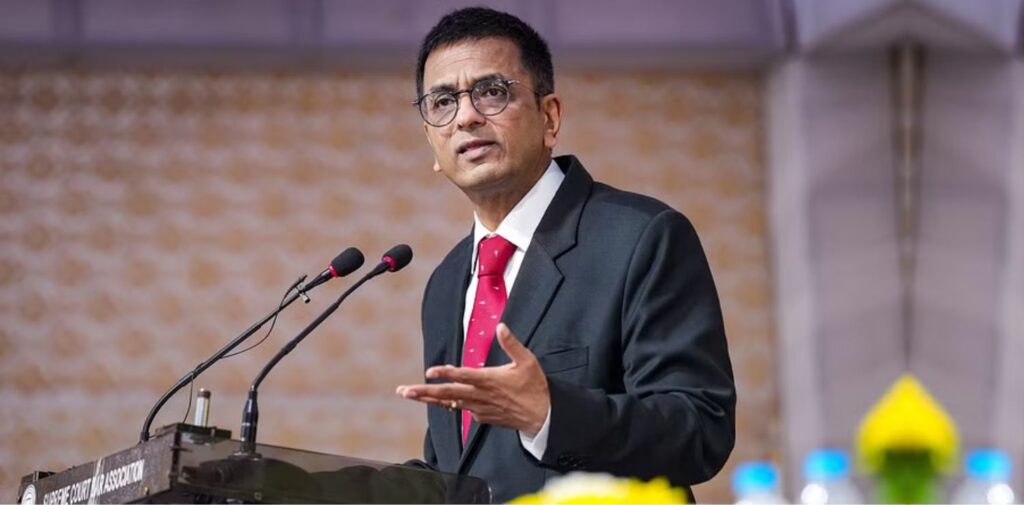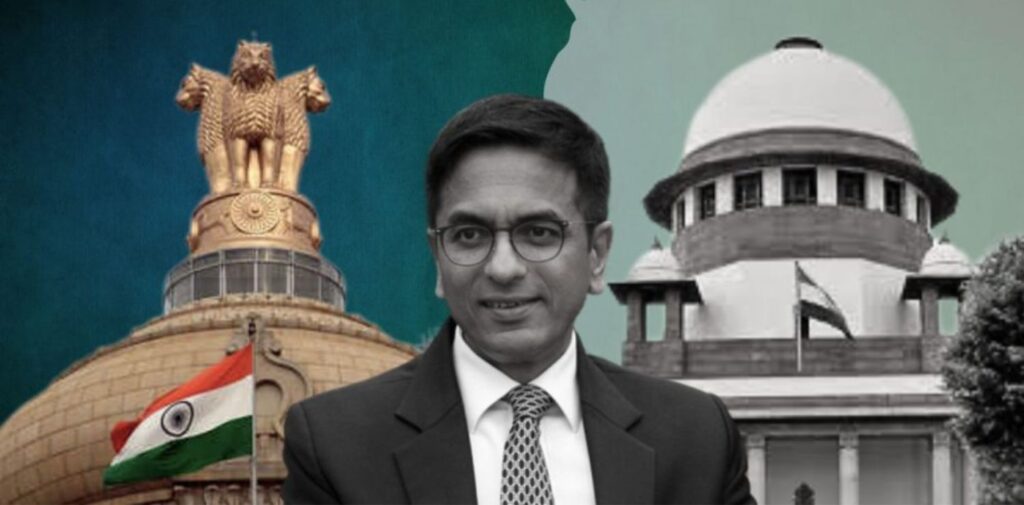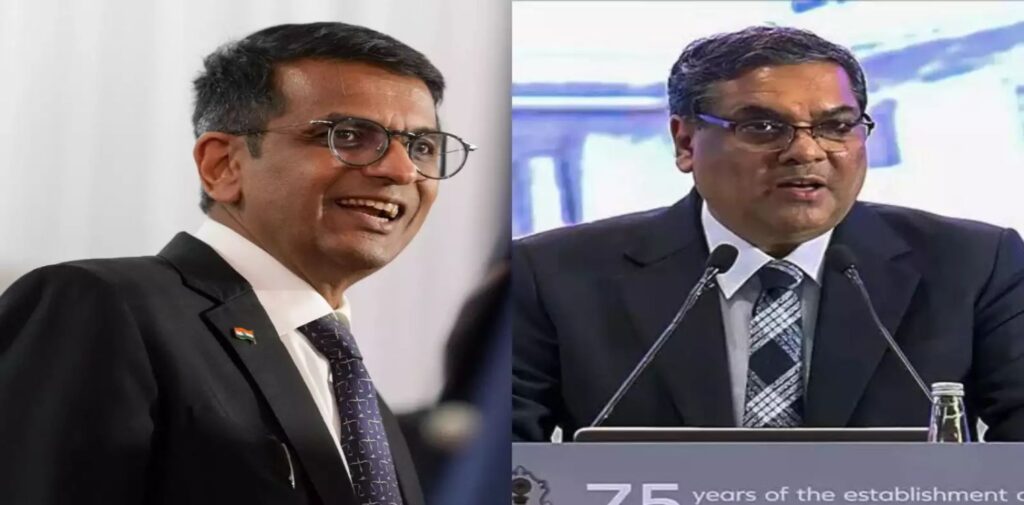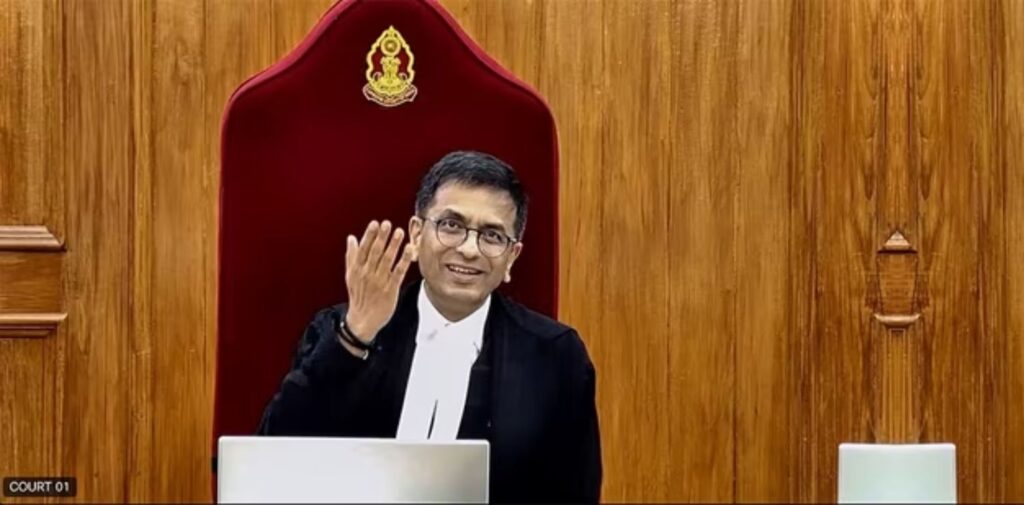In a poignant moment of reflection, the legal world a bid Farewell to CJI D.Y. Chandrachud, a Beacon of Justice who redefined the course of justice in India. Chief Justice of India (CJI) Dhananjaya Y. Chandrachud, in his emotional farewell address, took a moment to step back from the grandeur of his tenure, choosing instead to highlight the humanity of his role and the sense of fulfillment it brought him. As he completed his term as the 50th CJI, his words resonate deeply within the Supreme Court, leaving a legacy of empathy, integrity, and unwavering commitment to justice.
A Legacy of Compassionate Leadership
CJI Chandrachud’s tenure was marked not only by his legal acumen but also by his profound understanding of the societal impact of law. His farewell speech on November 8, 2024, was a testament to his remarkable ability to balance judicial rigour with empathy. It was a moment that was filled with both gratitude and reflection, not just on his accomplishments but also on the purpose that guided him every step of the way.
“I have always been moved by the words that Justice Bhagwati once said, ‘We are here only as pilgrims, do our work, and leave,'” said CJI Chandrachud during his farewell speech. This simple yet profound reflection encapsulated his approach to the law—humble, grounded, and focused on service. He viewed his role not as a position of power, but as a trust bestowed upon him to serve the people of India, especially those in need of justice.
Justice Chandrachud’s tenure at the helm of India’s highest judiciary was defined by his relentless pursuit of justice for the marginalized and vulnerable sections of society. His commitment to constitutional principles, his emphasis on human rights, and his inclusive approach to interpreting the law set a new benchmark for judicial leadership in the country. His remarks underscored the belief that no judicial officer can ever claim ownership over the law, but rather serves it as a caretaker—a sentiment that guided him throughout his illustrious career.

A Champion of Constitutionalism and Rights
CJI Chandrachud’s time as the head of the Supreme Court of India was marked by landmark judgments that reshaped Indian jurisprudence. He was instrumental in taking a bold stand on critical constitutional matters and human rights issues. His legacy will be forever intertwined with his support for progressive reforms in a wide array of legal areas—from the rights of LGBTQ+ individuals to the protection of fundamental freedoms.
One of the defining moments of his tenure came with his support for the decriminalization of Section 377 of the Indian Penal Code, a law that criminalized same-sex relations. In the historic judgment of 2018, which decriminalized homosexuality, CJI Chandrachud played a crucial role in the verdict, highlighting the right to equality and dignity for all citizens, irrespective of their sexual orientation. This judgment was a watershed moment for the LGBTQ+ community in India, offering them the hope of equal rights under the Constitution.
His contributions to gender justice were equally groundbreaking. CJI Chandrachud’s leadership was critical in upholding the rights of women, ensuring gender neutrality in the workplace, and advocating for equal opportunities for women in all spheres of life. The legal community will remember his insistence that the law must be an instrument of empowerment and not merely an enforcer of the social status quo.

A Vision for the Future of the Judiciary
CJI Chandrachud’s farewell speech was also a reflection of his deep concern for the future of the judiciary. He spoke about the importance of ensuring that the judiciary remains both independent and accessible to all citizens, particularly those who are disenfranchised or economically disadvantaged. He emphasized the importance of judicial accountability, urging his successors to continue making judicial processes more transparent and responsive to the needs of the people.
He also underscored the need for a sustained focus on the backlog of cases, acknowledging the need for judicial reform to ensure that justice is not delayed. During his tenure, CJI Chandrachud was known for his efforts to expedite the disposal of cases and streamline the court’s functioning, particularly in the digital era. His efforts to implement technology to make court proceedings more efficient and accessible were highly lauded, particularly as the country grappled with the disruptions of the COVID-19 pandemic.
One of the highlights of his leadership was the emphasis on the importance of a diverse and inclusive judiciary. He often spoke about the need for better representation of women and marginalized communities within the higher judiciary. His commitment to ensuring that the judiciary reflects the diversity of the Indian populace was a hallmark of his leadership.

Justice Sanjiv Khanna’s Emotional Tribute
In a deeply emotional farewell, Justice Sanjiv Khanna, CJI Chandrachud’s successor, described him as a “towering tree” in the judiciary. Justice Khanna, who has worked closely with CJI Chandrachud for several years, expressed that the departing Chief Justice was a guiding figure not just in legal matters but also in the human aspects of judicial administration. The metaphor of a towering tree, solid and ever-growing, aptly captured the strength and stability CJI Chandrachud brought to the Supreme Court.
Justice Khanna’s tribute, which was laced with affection and admiration, highlighted how CJI Chandrachud was not only a brilliant legal mind but also a mentor, a guide, and a friend to many in the judiciary. “He has always been someone who believed in the power of good relationships and mentorship,” Justice Sanjiv Khanna remarked, drawing attention to how CJI Chandrachud’s humility and approachability made him a beloved figure among his colleagues.
The Personal Touch: A Judge for the People
Beyond his legal brilliance, CJI Chandrachud was known for his personal touch. He was often seen engaging with court staff, lawyers, and even litigants, taking time to understand their concerns and guiding them with respect and patience. His sense of humor, and moments of levity, often provided a refreshing contrast to the otherwise intense atmosphere of the courtrooms.
In his farewell, CJI Chandrachud recalled lighter moments with his colleagues, such as the occasional shared samosas during breaks—a symbol of the camaraderie and the bond he cherished with those around him. His farewell speech was thus not just a formal address but a heartfelt reflection on the human connections he had fostered throughout his career.

A Legacy That Will Endure: Farewell to CJI D.Y. Chandrachud
As CJI D.Y. Chandrachud takes his leave from office, his tenure will be remembered for its unprecedented judicial leadership, marked by a commitment to fairness, inclusivity, and the rule of law. His visionary approach to judicial administration and his compassionate understanding of the needs of the common man will leave a lasting impact on the Indian judiciary for years to come.
In his farewell address, CJI Chandrachud encapsulated the true essence of a judicial career: service to the people, a pursuit of justice without compromise, and a relentless commitment to constitutional values. His words will resonate for generations, and his legacy will continue to inspire future judges, lawyers, and citizens alike. Indeed, as he aptly said, “There is no greater feeling than being able to serve those in need”—a sentiment that will forever define the legacy of CJI D.Y. Chandrachud.
As India looks to the future of its judiciary, the example set by CJI Chandrachud will serve as a guiding light for the generations of legal professionals and citizens who follow.



